 We all have reasons for procrastinating when it comes to estate planning. However, before you put this important life decision back on the shelf again, you might want to know a few of the things that can happen to your money and possessions upon your death if you haven’t planned. These Kansas probate rules may encourage you to move just a little quicker to finish or update your estate planning. Did you know?
These are just a few of the Kansas probate laws that control what happens to your money and property after your death. If you have questions about probate or estate planning matters, contact Davis & McCann, P.A., Dodge City, Kansas at 620-225-1674. We are members of Wealth Counsel, a national consortium of Estate Planning Attorneys and the National Academy of Elder Law Attorneys (NAELA). We focus our practice on providing clients with the best legal advice on Estate Planning, Medicaid and Long-term Care Planning, Special Needs Planning, Family Business/Small Business Succession Planning, Probate, Trust Administration, Real Estate, 1031 Exchanges, and related matters. 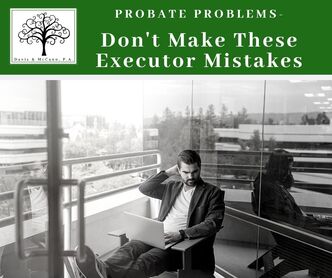 Are you unwittingly making mistakes as an Executor of an Estate? If so, you could be in for a legal battle of your own! To help protect you in your role as Executor, we’re sharing a few of the most common mistakes we’ve seen made by Executors, that you’ll want to avoid.
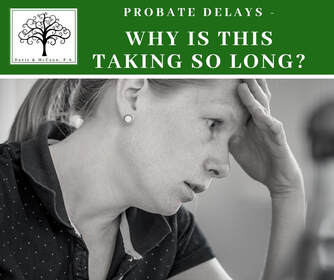 Q: “My mother, who resided in Kansas, died in June. She had a Last Will and Testament and owned several pieces of real estate. She told us children that we would receive an equal share of her estate. How long will I have to wait to receive my share and what situations might delay the distribution?” A: Because your mother chose to use a Will as her estate planning strategy, her estate will require a probate action initiated by the filing of a Petition for Probate of Will with the District Court in the county of her permanent residence. Filing must happen within six months after the date of her death. Failure to file her Will within this six month period will result in her estate being handled as if no Will existed. Anyone having knowledge and access to her Will may offer it for probate at any time within the six months following her death. Usually, the Executor or Administrator named in her Will is responsible for filing the Petition with the assistance of a probate attorney. Your Mother’s estate may need to file a federal estate tax return. Kansas currently doesn’t have an estate tax, so no state estate tax return should be necessary, unless your Mother owned property in another state. Tax payments are due no later than nine months after the date of death. For your mother’s estate, these tax returns must be filed and paid (if applicable) no later than next March, unless an extension has been properly requested. Additionally, if your mother owned property in a state other than Kansas, a separate probate action in that state may be required. After the Petition for Probate of Will has been filed, you generally can expect the Executor or Administrator to be appointed by the Court within 4 to 5 weeks from the date the petition is filed. If your mother had outstanding debts due to creditors, they have 4 months after they have been notified to file their claims against the estate. Any distributions of an estate will typically not occur until after this time period has run. Since each estate is unique, no exact time schedule can be given for the length necessary to probate an estate. Distributions to beneficiaries generally don’t happen until the estate is ready to close, but if circumstances warrant it, the Executor or Administrator may do a partial distribution prior to that time. Some factors that may delay an estate closure and distribution can include: 1. Appraisal of real property, equipment and household items. A certified appraiser is not always available in a timely fashion, especially for rural residents. Certified appraisers are often booked out months in advance, or must travel long distances, so obtaining a quick appraisal for the real estate isn’t always feasible. If family members are contentious, multiple appraisals may be required to satisfy the parties involved, which can add to the delay. 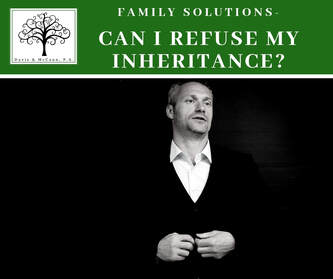 Q: Dad died without a Will or Trust. From what I understand of Kansas law, my sibling and I will share equally in one-half (1/2) of his estate and Mom will inherit the other one-half (1/2). My parents were not economically stable at the time of my father’s death. My sibling and I both are financially comfortable, are not married and have no children. Is there any way we can reject our inheritance, and have it go to our mother so she could live more comfortably? A: Under Kansas probate law, you and your sibling can disclaim your inheritance, which would allow your mother to receive 100% of your father’s estate. If you had children, your share would pass to them, instead of your mother, pursuant to Kansas intestate law. However, in this situation, the disclaimers from you and your sibling would provide for your shares to be redirected to your mother. Disclaimers are used in post-mortem (after death) planning for different reasons. One major reason is to avoid unnecessary tax issues. If a parent leaves his well-off children property this bequest may create future estate tax problems for his grandchildren. If the children disclaim the property now, it can often pass directly to the grandchildren who may not have an estate tax problem. There are a few rules you must also follow if you intend to disclaim inherited property. 1. Written Document. Your disclaimer must (1) be a written instrument describing the property, interest or power you are disclaiming; (2) contain a declaration of disclaimer; and (3) be signed and acknowledged by the disclaimant. 2. Time Limit. States have different laws concerning how long you have to disclaim property, but if you are disclaiming property due to federal estate tax issues, you usually have to file your disclaimer within 9 months of the decedent’s death. Beneficiaries under the age of 21 have additional time to disclaim their interest. 3. No Acceptance. You cannot receive any benefit from the property before disclaiming it. For example, if the property is an investment portfolio, you cannot cash a dividend check and then disclaim the portfolio. If your inheritance is real estate, you can't accept any rent if you intend to later disclaim the property. 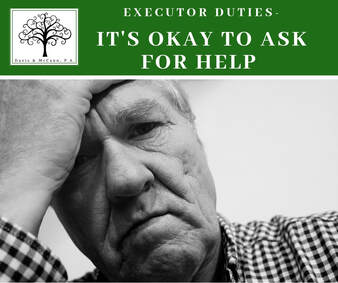 When your loved one dies, an experienced probate attorney can be a great asset. If your loved one had a will then there should be a person named to be in charge of wrapping up the estate, called an Executor. The Executor is generally a surviving spouse, an adult child, a trusted friend or relative, or a trust company named in the will. If your loved one had no formal will appointing an Executor, a court appointed Administrator may be required to pass assets on to his/her heirs at law. The Executor or Administrator has a special responsibility to act in the best interest of the Estate beneficiaries and see that the Estate assets and money are not wasted. If you are an Executor or Administrator, one of the smartest ways to ensure you are acting in the best interests of the Estate beneficiaries is to hire an experienced probate attorney. Your attorney should be willing to provide you with a basic education of the probate process so you can determine which tasks you can handle independently and which ones will require professional guidance. The Estate is responsible for paying the attorney fees, so there should be no personal cost to you. Hiring a probate attorney who has good communication skills and makes themselves available to you is the ticket to a successful estate administration. The following is a sample of services an experienced probate attorney should offer Executors or Administrators during the probate process: 1. Assist with obtaining copies of death certificates and a dated obituary notice and/or newspaper articles. 2. Coordinate meetings with the decedent’s family and/or beneficiaries, as necessary. 3. Advise on checking the contents of any safe deposit boxes and on obtaining copies of marriage and birth certificates. 4. Help with compiling a list of heirs, next of kin and beneficiaries. 5. Review the decedent’s will with the Executor/Administrator and decedent’s family to determine whether probate is needed and if so, what probate proceeding is most appropriate. 6. Proceed with probate filing, if no trust was created. 7. If necessary, obtain letters testamentary or letters of administration for the executor/administrator from the court. 8. Assist with inventory of tangible real estate property and obtaining real estate deeds, mortgages, leases, and tax information, as well as provide guidance with inventorying and securing personal items such as cars, trucks, boats, recreational vehicles, mobile homes, motorcycles, furniture, fine jewelry, art and personal contents of the home(s).  You know you need to do your estate planning but you have a problem: a “problem child” more specifically, who has caused a kink in your plans. If you have an adult child with a history of mismanaging their life, it’s likely you’ve wrestled with HOW or IF to include them as a beneficiary of your estate. Having an adult child who struggles through life can complicate an otherwise simple estate plan. When our clients are in turmoil over how to include a problem child in their estate, their adult child usually has demonstrated a weakness in one or more of the following areas: • Gambling addiction • Drug or alcohol addiction • History of criminal activity • Inability to hold steady employment • History of financial mismanagement • Mental health issues • History of unhealthy relationships or marriages • History of causing unnecessary drama with other family members Sadly, if you fret that one of your children will be a problem during the administration of your estate, your worries probably are justified. Death does not often bring out the best in people. The stress that arises after a death can heighten behavioral problems. Here are a few things you can do to reduce the chance of your child creating problems during the administration of your estate: 1. Experience matters. If you suspect that one of your children will be difficult during your estate administration, hire the best estate planning attorney you can find. There are many things you can do yourself, but preparing your own estate plan should not be one of them. Experienced estate planning attorneys possess knowledge of sophisticated legal options that rarely are offered to you on internet sites or by attorneys with little or no estate planning experience. 2. Hire a professional fiduciary. If you cannot find anyone to serve as the executor or trustee of your estate, consider this an indicator of brewing problems. It may mean one of your kids has a well-known difficult personality or reputation. If you find this situation to be true, consider hiring a professional advisor or trust company to manage your estate. A professional fiduciary may cost more, but in the long-run it will save legal fees and stress. Professional fiduciaries are accustomed to handling disgruntled family members.  Aunt Ethel died a few weeks ago. Her remaining assets are fairly modest. Their value doesn’t justify going through the expense of a full probate. What’s the family to do if the beneficiaries still want those remaining assets? How can the assets be transferred to the beneficiaries without costing an arm and a leg? Enter the Small Estate Affidavit. In Kansas, if there is no real estate involved (including minerals) and the personal property of a decedent (a/k/a deceased person) is valued under $40,000, a Small Estate Affidavit can be used to transfer the estate assets to the beneficiaries. Small Estate Affidavits are forms used to grant authority to a person (usually an executor or beneficiary named under a Will or an heir of the decedent) to transfer and take responsibility for a deceased person’s personal property assets. However, if the value of the personal property exceeds $40,000, or if real estate is owned in the estate, a different probate proceeding will be required to transfer the estate assets.  You’ve been named in a Last Will and Testament as an Executor of a Kansas Estate, so now what do you do? Before you begin your role as Executor, here are a few things you might want to know. As Executor, you have the responsibility of distributing the assets of the Estate to the intended beneficiaries, pursuant to the decedent’s Last Will and Testament. You must understand complex legal and/or financial concepts during the course of your job. As a result, Executors should hire an experienced probate attorney to assist them with the probate process and help them avoid costly mistakes. Here is a basic summary of what you can expect the probate process to include: 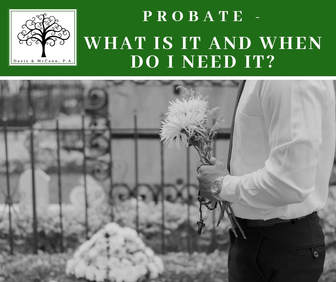 Probate is a judicial process whereby the decedent’s assets are transferred to his or her heirs or other beneficiaries. Probate also can be referred to as an estate administration. In Kansas, your estate will fall under one of two categories: testate or intestate. If the decedent had a Last Will and Testament, he or she would have a testate estate. An intestate estate occurs when the decedent died leaving no Last Will and Testament and the state laws of intestacy determine who is entitled to the decedent’s assets. Typically, the surviving family members of the decedent will seek the counsel of an experienced probate attorney to navigate the probate process. The attorney will determine whether the Last Will and Testament is valid, conclude whether a probate is necessary, and will advise the Executor or Estate Administrator in his or her duties. |
NEWS YOU CAN USEDavis & McCann, P. A., Archives
April 2021
Categories
All
|

 RSS Feed
RSS Feed